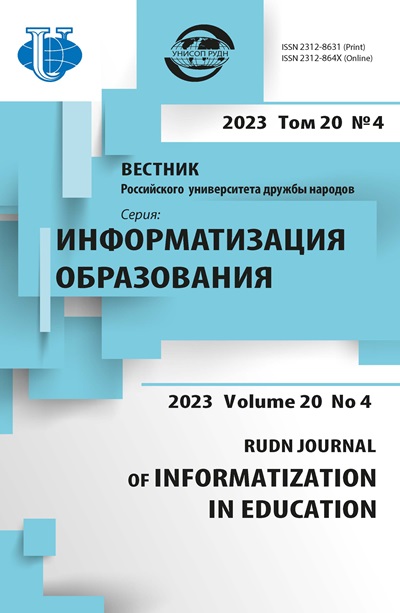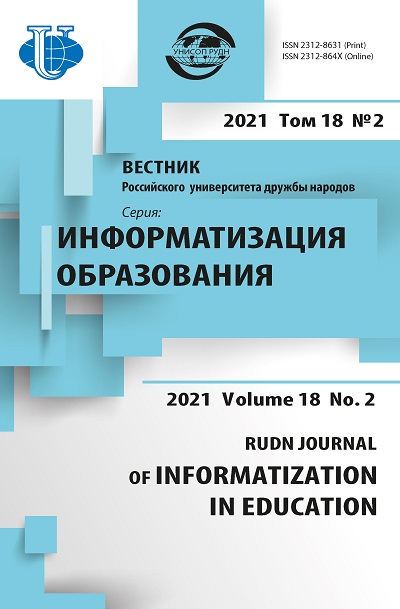Models of using immersive teaching technologies in the practical activity of a teacher of informatics
- Authors: Azevich A.I.1
-
Affiliations:
- Moscow City University
- Issue: Vol 18, No 2 (2021)
- Pages: 152-161
- Section: TEACHING COMPUTER SCIENCE
- URL: https://journals.rudn.ru/informatization-education/article/view/27337
- DOI: https://doi.org/10.22363/2312-8631-2021-18-2-152-161
Cite item
Full Text
Abstract
Problem and goal. Virtual, augmented mixed reality and augmented virtuality are becoming integral attributes of the immersive educational environment, disposed to continuous learning and comprehensive development. The relevance of the study of models of using immersive technologies in the activities of a computer science teacher is beyond doubt, because they are the real embodiment of new methodological ideas and approaches. Methodology. In the course of the research, the analysis of models of immersive learning technologies for the practical activities of a computer science teacher was carried out. On its basis, a set of computer tools and equipment has been proposed that allows introducing immersive technologies into educational practice. Results. Methodological recommendations on the use of virtual, augmented and mixed reality technologies both in informatics lessons and after school hours are presented. The key topics of the computer science program, in which it is advisable to use immersive technologies, have been identified. Methodological approaches to the transformation of informatics teaching in the context of digitalization of education have been formulated. Conclusion. The results of the study indicate that immersive learning technologies can be successfully applied both in informatics lessons and outside the classroom. They not only contribute to the immersion of students in an interactive environment, but also increase the interest, motivation and quality of their knowledge. Lessons using immersive technologies open up new opportunities for a computer science teacher for professional growth, methodological and subject self-improvement.
About the authors
Alexey I. Azevich
Moscow City University
Author for correspondence.
Email: azevichai@mgpu.ru
ORCID iD: 0000-0002-8416-2415
Candidate of Pedagogical Sciences, Associate Professor, Department of Informatization of Education
29 Sheremetyevskaya St, Moscow, 127521, Russian FederationReferences
- Azevich AI. Immersive learning technologies: the space of possibilities. Horizons and risk education in a systemic change and transformation: collection of scientific papers of the XII International Scientific and Practical Conference. Moscow: Mezhdunarodnaya akademiya nauk pedagogicheskogo obrazovaniya Publ.; 2020. p. 227–230. (In Russ.)
- Azevich AI. Immersive technology as a means of visualization of educational information. Bulletin of the Moscow City Pedagogical University. Series: Informatics and Informatization of Education. 2020;2(52):35–43. (In Russ.)
- Azevich AI. Augmented reality and augmented virtuality as types of immersive technologies. Fundamental problems of teaching mathematics, informatics and informatization of education: collection of abstracts of reports of the International Scientific Conference Dedicated to the 180th Anniversary of Teacher Education in Yelets. Yelets; 2020. p. 116–118. (In Russ.)
- Azevich AI. Immersive educational environments: design, construction, use. Informatization of education and methods of electronic learning: digital technologies in education: materials of the IV International Scientific Conference (Krasnoyarsk, 6–9 October 2020) (issue 2). Krasnoyarsk: SFU Publ.; 2020. p. 357–361. (In Russ.)
- Azevich AI. Virtual reality as a simulation model. Mathematical modeling and information technologies in education and science: collection of materials of the IX International Scientific and Methodological Conference dedicated to the 75th anniversary of Professor E.Y. Bedajbekova and 35th of school informatics. Almaty: KazNPU imeni Abaya Publ.; 2020. p. 166–171. (In Russ.)
- Bazhenova SA. Change in the content of the school course of informatics under the influence of the development of immersive technologies. Informatization of education and methods of electronic learning: digital technologies in education: materials of the IV International Scientific Conference (Krasnoyarsk, 6–9 October 2020) (issue 2). Krasnoyarsk: SFU Publ.; 2020. p. 367–371. (In Russ.)
- Grinshkun AV. The possibilities of using augmented reality technologies in teaching informatics to schoolchildren. Bulletin of the Moscow City Pedagogical University. Series: Informatics and Informatization of Education. 2014;3(29):87–93. (In Russ.)
- Ivanova AV. Technologies of virtual and augmented reality: opportunities and obstacles of application. Strategic Decisions and Risk Management. 2018;3(108):88–107. (In Russ.)
- Eliseeva MA. Topology of media: from augmented reality to augmented reality. Bulletin of the Development of Science and Education. 2019;(2):83–90. (In Russ.)
- Milgevskaya EA, Sedyolkin IS, Sedyolkina YS. Innovative technologies in scientific research. High Technologies and Innovations in Science: Collection of the Articles of the International Scientific Conference. Saint Petersburg: GNII “Natsrazvitie” Publ.; 2020. p. 53–58. (In Russ.)
- Podkosova YG, Varlamov OO, Ostrouh AV, Krasnyanskij MN. Analysis of prospects for using virtual reality technologies in distance learning. Voprosy Sovremennoj Nauki i Praktiki. 2011;2(33):104–111. (In Russ.)
- Selivanov VV, Selivanova LN. Efficiency of using virtual reality in teaching in youth and adult age. Lifelong Education: the XXI century. 2015;1(9):133–152. (In Russ.)
- Azevich AI. Virtual reality: educational and methodological aspects. RUDN Journal of Informatization in Education. 2019;16(4):338–350.
- Goldman S. The real deal with virtual and augmented reality. Available from: http://www.goldmansachs.com/our-thinking/pages/virtual-and-augmented-reality.html (accessed: 10.12.2020).
- Radkowski R. Investigation of visual features for augmented reality assembly assistance. International Conference on Virtual, Augmented and Mixed Reality. Springer; 2015. p. 488–498.
















